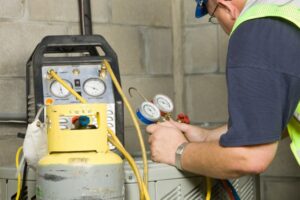
The simple answer to this question is “Hopefully never.”
Confused? Don’t worry—many people aren’t used to how refrigerant works in their homes’ air conditioning systems. We’re glad to shed light on this to help you better understand how your AC runs. Knowing just a bit about AC refrigerants can help you know when you need to call us for professional repairs for your air conditioning in Annapolis, MD.
We’re going to divide the answer to the original question into two parts: Why you shouldn’t need to put more refrigerant in your AC and Why you might need more refrigerant anyway.
Why you shouldn’t need to put more refrigerant in your AC
We understand why people might think their air conditioner will run out of refrigerant at some point: they assume the AC uses the refrigerant as a fuel that it gradually uses up. But refrigerants are not energy sources that power an AC. What powers an AC is electricity. The refrigerant inside an air conditioner does a different job, which is heat transfer.
Basically, refrigerants are chemicals designed to shift easily between liquid and gaseous states. As refrigerant changes from one state to another, it absorbs and releases heat. When hot refrigerant condenses in the outdoor coil, it releases heat. When cold refrigerant evaporates in the indoor coil, it absorbs heat. Through this cycle of evaporation and condensation, the refrigerant moves heat from inside the house and releases it outside.
The refrigerant is in a closed-loop system, so as it evaporates and condenses it doesn’t dissipate. This is why you shouldn’t need to ever “refill” the AC with refrigerant: the system will retain the same amount for the life of the air conditioner. This set amount of refrigerant is called the air conditioner’s charge.
Why you might need more refrigerant anyway
We keep using the word shouldn’t when talking about needing more refrigerant, so obviously there are times when an AC needs a recharge. Those times are when an AC develops a leak along the refrigerant lines.
Leaks can happen because of corrosion, which is unfortunately common in air conditioners more than five years old. When an AC loses refrigerant, the whole system is in jeopardy. Loss of refrigerant doesn’t just harm the air conditioner’s cooling capacity; it changes the pressure inside the system and endangers the compressor. If refrigerant leaks aren’t repaired and the system recharged, the compressor will eventually burn out.
There are several signs that will warn you your AC may have a refrigerant leak:
- Hissing or bubbling sound from the AC’s cabinets
- A rise in indoor humidity
- Ice appearing on the evaporator coil
- The AC turning on and off rapidly for over an hour
- A steep rise in cooling costs
Although there are other possible problems behind these symptoms, you’ll want them investigated no matter what. Call our professionals: if we discover leaks, we can patch them up and then recharge the AC to its factory level. (Never trust an amateur to do this, since they may overcharge the air conditioner, which will also cause the compressor to fail.)
Call on B&B Air Conditioning & Heating Service when you have worries about your AC. We are always there when you need us.


